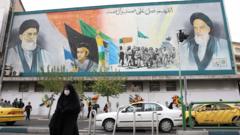Iran's supreme leader, Ayatollah Ali Khamenei, and his advisors are currently faced with perilous choices that could either escalate tensions further or signal perceived weakness against Israeli operations supported by the United States. As exchanges of direct military strikes continue to unfold, the implications for the broader regional stability will hinge on Iran's next decisive moves.
### Iran's Hard Choices: Escalation Risks vs. Perception of Weakness

### Iran's Hard Choices: Escalation Risks vs. Perception of Weakness
The ongoing conflict in the Middle East intensifies as Iran grapples with formidable decisions in the wake of increased Israeli military aggression.
As tensions escalate following recent attacks, Iran finds itself at a critical crossroads. The nation can opt for a retaliatory approach, launching further ballistic missile strikes against Israel, or it may choose to contain its military response to avoid potential escalations that could spiral out of control. The latter option could place Iran in a precarious position, as it risks appearing weak in front of both domestic and international audiences. Statements from Iranian officials have hinted at a readiness to respond militarily, with unwavering assurances of self-defense rights under international law since Iranian missile assaults on Israel began.
The narrative from Iran's leadership has been tough, vowing retribution for aggression; yet, the realities on the ground suggest that Iran must weigh the long-term consequences of potential retaliation against Israel. The Israeli military has significantly increased its offensive operations targeting Iranian interests in the region, escalating hostilities since the Hamas attacks in October 2022, where approximately 1,200 lives were lost.
The U.S. administration, under President Biden, has maintained support for Israel while simultaneously urging restraint to minimize amplifying regional conflicts. Despite the U.S. backing, Iran's complex dynamics with its regional allies—such as Hezbollah and the Houthis—present challenges in formulating a coherent strategy amid ongoing combat operations. The Israeli government is implementing aggressive tactics to disrupt Iranian leadership structures and its critical support to allied militias.
As the specter of a wider war looms, the insistence on self-defense by both sides signals a prolonged conflict if diplomatic avenues are not prioritized soon. Moving forward, the implications of the upcoming U.S. elections on November 5 could further influence the choices made by Iran, particularly with the potential return of Donald Trump, who may exhibit different strategic priorities compared to Biden.
The international community remains vigilant, as the outcome of Iran’s next steps could either herald a period of heightened conflict or offer opportunities for renewed diplomatic negotiations regarding its nuclear ambitions. Ultimately, the stakes have never been higher as the region stands on the brink of potential chaos.
The narrative from Iran's leadership has been tough, vowing retribution for aggression; yet, the realities on the ground suggest that Iran must weigh the long-term consequences of potential retaliation against Israel. The Israeli military has significantly increased its offensive operations targeting Iranian interests in the region, escalating hostilities since the Hamas attacks in October 2022, where approximately 1,200 lives were lost.
The U.S. administration, under President Biden, has maintained support for Israel while simultaneously urging restraint to minimize amplifying regional conflicts. Despite the U.S. backing, Iran's complex dynamics with its regional allies—such as Hezbollah and the Houthis—present challenges in formulating a coherent strategy amid ongoing combat operations. The Israeli government is implementing aggressive tactics to disrupt Iranian leadership structures and its critical support to allied militias.
As the specter of a wider war looms, the insistence on self-defense by both sides signals a prolonged conflict if diplomatic avenues are not prioritized soon. Moving forward, the implications of the upcoming U.S. elections on November 5 could further influence the choices made by Iran, particularly with the potential return of Donald Trump, who may exhibit different strategic priorities compared to Biden.
The international community remains vigilant, as the outcome of Iran’s next steps could either herald a period of heightened conflict or offer opportunities for renewed diplomatic negotiations regarding its nuclear ambitions. Ultimately, the stakes have never been higher as the region stands on the brink of potential chaos.




















